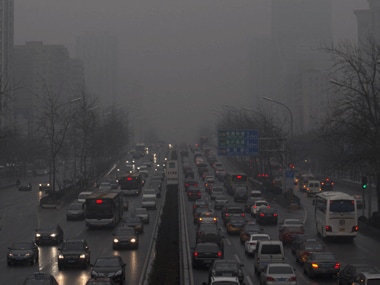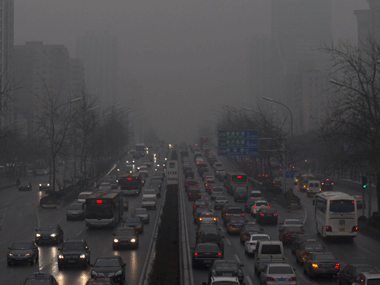I live in Delhi and I don’t have a car. It’s not because I hate cars or I am dismissive of the signaling value car ownership has in a highly status conscious city or I am really worried about its potential contribution to the toxicity around. In fact, I have always dreamt of owning a car, preferably a sedan - it’s about those small-town upwardly mobile aspirations, personal goal-setting, sense of achievement, and finally the announcement of arrival. I have a son, who’s 11. He goes out to school at 7.30 am in the morning and rushes out to play with friends at 4.30 pm in the afternoon. After shifting to Delhi after nine years in Mumbai, I was happy for him. The East Delhi locality we stay in had vast open spaces and in the residential society itself there was enough free area for kids to play and run around. It was impossible in Mumbai. Till the gravity of the pollution matter hit home, and till there were news items screaming out loud that East Delhi area was the most dangerous to live in, I didn’t have a sense of guilt. [caption id=“attachment_2526446” align=“alignleft” width=“380”]
 Representational image. AP[/caption] Now I realise my kid is growing up in a very unhealthy place. He is not safe when he is starting for school or going out to play. He’s inhaling a lungful of a concoction of toxic elements every time he breathes, and it might leave him with life-long respiratory diseases and weak lungs. As a parent my question to myself is am I being responsible to him by staying in Delhi? Since vehicles are the primary cause of pollution, there’s another question: is my car dream bigger than the health of my child? I am a journalist. The profession dehumanizes you a bit. By pretending to be intelligent all the time one tends to blunt the human sensitivity within. It was all too evident when fellow journalists went full throttle to slam the Arvind Kejriwal government for coming up with the odd-even formula to limit the number of cars on the streets of the National Capital. The questions were many: ‘How on earth are you going to implement this?’; ‘How do you stop cars from other states?’; ‘How do you expect to get the cooperation of the police force which is not under your control?’; ‘Hasn’t this failed to be a long-term solution in cities across the globe where it was implemented?’ ‘Won’t people buy second cars?’ In short, it is a bird-brained idea that is bound to fail. Conspicuous in this damning exercise has been the absence of constructive suggestions. If not this, then what? The silence is deafening. The media debates, barring a few, convey the impression that air pollution in Delhi is only the government’s responsibility. People cannot be asked to get off their cars for even a day since other than the convenience matter, it’s a matter of their right too. Political parties have jumped in to ridicule the idea. That they haven’t come up with a better suggestion is par for the course. One shouldn’t be surprised if someone moved the court against it. The mockery of the idea overwhelms the concern for the bigger issue. What about extending support to the government to spread awareness on the pollution issue? What about trying to convince car owners that it is our city and we need collective effort to save it? Expect none of this. We live in a cynical, misanthropic world. Even the lives of children don’t bother us anymore. As a journalist I can afford to be insensitive, but certainly not as a father. Now this is the question bothering me: Does my kid have to suffer because other people have to drive cars? The answer is obvious. What about myself owning a car? Well, I still want to have one. But I have to follow whatever the government asks me to do. They are not asking me to abandon the car dream, they are only asking me to be more responsible. As a caring citizen, I see nothing offensive about it.
Representational image. AP[/caption] Now I realise my kid is growing up in a very unhealthy place. He is not safe when he is starting for school or going out to play. He’s inhaling a lungful of a concoction of toxic elements every time he breathes, and it might leave him with life-long respiratory diseases and weak lungs. As a parent my question to myself is am I being responsible to him by staying in Delhi? Since vehicles are the primary cause of pollution, there’s another question: is my car dream bigger than the health of my child? I am a journalist. The profession dehumanizes you a bit. By pretending to be intelligent all the time one tends to blunt the human sensitivity within. It was all too evident when fellow journalists went full throttle to slam the Arvind Kejriwal government for coming up with the odd-even formula to limit the number of cars on the streets of the National Capital. The questions were many: ‘How on earth are you going to implement this?’; ‘How do you stop cars from other states?’; ‘How do you expect to get the cooperation of the police force which is not under your control?’; ‘Hasn’t this failed to be a long-term solution in cities across the globe where it was implemented?’ ‘Won’t people buy second cars?’ In short, it is a bird-brained idea that is bound to fail. Conspicuous in this damning exercise has been the absence of constructive suggestions. If not this, then what? The silence is deafening. The media debates, barring a few, convey the impression that air pollution in Delhi is only the government’s responsibility. People cannot be asked to get off their cars for even a day since other than the convenience matter, it’s a matter of their right too. Political parties have jumped in to ridicule the idea. That they haven’t come up with a better suggestion is par for the course. One shouldn’t be surprised if someone moved the court against it. The mockery of the idea overwhelms the concern for the bigger issue. What about extending support to the government to spread awareness on the pollution issue? What about trying to convince car owners that it is our city and we need collective effort to save it? Expect none of this. We live in a cynical, misanthropic world. Even the lives of children don’t bother us anymore. As a journalist I can afford to be insensitive, but certainly not as a father. Now this is the question bothering me: Does my kid have to suffer because other people have to drive cars? The answer is obvious. What about myself owning a car? Well, I still want to have one. But I have to follow whatever the government asks me to do. They are not asking me to abandon the car dream, they are only asking me to be more responsible. As a caring citizen, I see nothing offensive about it.
Insensitive India: Does my kid have to suffer because someone must drive his car everyday?
Akshaya Mishra
• December 6, 2015, 09:25:52 IST
Delhi government is not asking you to abandon your car dream, just asking you to be a little more responsible. There is nothing offensive about it.
Advertisement
)
End of Article